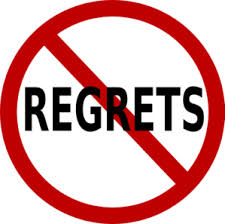Regret is a downer – plan and simple. Most of us try to avoid it as best we can. We associate regret with disappointment, unhappiness, grief, and heartbreak. Bronnie Ware’s book,The Top Five Regrets of Dying, dives straight into the depths of having regrets at the end of one’s life. Bronnie cared for patients in their final weeks of life and recorded their common regrets. Below is a list of these patients’ most frequent concerns.
1. I wish I’d had the courage to live a life true to myself, not the life others expected of me.
2. I wish I didn’t work so hard.
3. I wish I’d had the courage to express my feelings.
4. I wish I had stayed in touch with my friends.
5. I wish that I had let myself be happier.
This is a great list to put in your pocket and take out every now and again to put things into perspective. But it’s also a great tool for those of us looking for guidance on living a fulfilling life. I’d like to explore how avoiding the first regret – not being true to oneself – might create a positive ripple effect and diminish the likelihood of having any of the regrets listed above.
Being Inauthentic
Being true to oneself is a bit of a paradox, in that it seems like it should be as easy as falling off a log, yet it can be a lifelong struggle to achieve. From the psychological perspective, we may not be our true selves because we feel we need to act a certain way or say a particular thing to please our bosses, spouses, or parents. This social pressure to act contrary to our true nature can be intense. If you are constantly trying to impress others or live up to the expectations of others, you are living an inauthentic life. Living without authenticity can make you feel tired, anxious, confused, depressed, helpless, or angry. Given these negative consequences, it’s no wonder that “not being true to oneself” is first on the Bronnie’s regret list.
Being Authentic
Being authentic or “being true to oneself” means getting clear about the things that are really important to you. Research in the field of organizational behavior has found that authenticity is positively associated with well-being at work. Why? Because if you are able to live and work in a way that expresses your own values and truths, that promotes well-being.
Keeping up appearances and always doing things that make others happy without considering your own happiness, means that you are sacrificing a piece of yourself. It makes sense that being authentic is correlated with psychological well-being, including vitality, self-esteem, and coping skills.
Let’s consider how likely it would be for a person who is living authentically to work too much, hide their feelings, lose touch with friends, or shun happiness. It seems unlikely, doesn’t it? Living authentically promotes listening to that voice inside yourself that encourages you to put limits on work, express your true feelings, stay connected with friends, and embrace happiness.
One Rule – Not Five
Simplify your to-do list. Don’t spend time worrying about the many regrets you might have later in life – or even the five that Bronnie mentions. Instead, spend more time thinking about who you are and what you value most in this one life you get to live. When your actions mirror your values, everything will fall into place.

